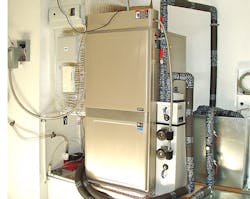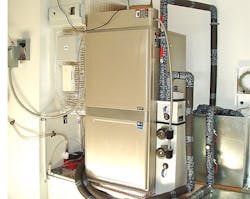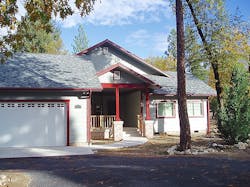The geothermal heat pump (GHP) industry is fighting a battle for its life in the Golden State, squaring off with the California Energy Commission (CEC) about building codes they say will kill new installations of the technology if not changed.
“The CEC is about to adopt amendments to its 2013 and 2016 Title 24 energy code that would effectively outlaw residential use of GHPs,” explained California Geothermal Heat Pump Association (CalGEO) President Bill Martin; he also owns Martin Energetics, Quincy, Calif. “California leads the nation in energy efficiency, yet the CEC would lock out the most efficient, carbonless heating and cooling technology in history!”
Worse, the latest CEC Title 24 amendments prioritize the use of natural gas for all new homes where it is available. “How will that help achieve California’s ambitious carbon reduction goals to combat climate change under AB 32?” Martin asks.
Title 24 is a set of building regulations that address energy efficiency in California buildings. They have been in effect since the early 1980s. The most recent CEC update to the regulations was in 2013. For GHPs, the CEC’s currently proposed amendments to the 2013 Title 24 rules are the same as those already written into the regulations for 2016, which are scheduled for publication in 2017.
According to Martin, the CEC Title 24 rules and amendments are not clear about how GHPs can be legally permitted, and provide no guidance or compliance software for contractors to use that prove GHP heating and cooling efficiency so that building permits can be granted.
GHP stakeholders submitted more comments to the workshop docket than any other industry.—Bill Martin, president of CalGEO
“They have no approved measurement software that includes GHPs,” Martin explained. “Compliance software for every other energy efficiency industry was developed and paid for by the CEC, but the GHP industry was left out. We face a cost of hundreds of thousands of dollars to develop a system for compliance with their revisions to Title 24 that the agency may or may not agree to.”
Several geothermal manufacturers and businesses demanded a hearing on the CEC’s proposed new rules, some of which affect other industries like energy efficient lighting. Their demands were granted at an agency sponsored workshop in Sacramento on April 10.
GHP stakeholders submitted more comments to the workshop docket than any other industry,” said Martin. “We were noticed.”
The national Geothermal Exchange Organization (GEO) provided comments for the record as well.
They are willing to work with us to develop an alternative program for GHPs to comply under Title 24.—Bill Martin, president of CalGEO
Martin pointed out during the meeting that only two years ago, the CEC ordered (through Title 24) that all new residential construction achieve Zero Net Energy (ZNE) by 2020, and new commercial buildings by 2030. A ZNE building produces as much energy on-site as it consumes on an annual basis.
“Yet my own all-electric ZNE home would not be possible under proposed amendments to 2013 Title 24 rules,” Martin lamented.
It’s widely accepted among architects, designers and builders that ZNE is difficult to achieve without the efficiency of geothermal heating and cooling.
Workshop participants called on the CEC to make good on their promise to work with industry groups to address Title 24 issues. The result was a follow-up meeting on May 14 between GHP industry representatives and CEC officials, who were sympathetic to the industry’s position.
"They are willing to work with us to develop an alternative program for GHPs to comply under Title 24,” Martin said.
CalGEO has pledged to cooperate in good faith with the CEC toward an acceptable solution to the problems that GHPs are now experiencing with the agency’s efficiency rating methods under Title 24.
“We’ve agreed to work on modifying current CEC efficiency software to accommodate GHPs, with name-plate performance coupled with published AHRI GHP test data,” Martin explained. “Both are dependable predictors of GHP performance and efficiency, especially when used with GHP manufacturer software for predicting how much ground loop is needed for any size heat pump.”
Martin continued, “We will be doing our homework to develop a clear, simple and easy to understand mechanism to solve the problem. We will be writing and exchanging language and metrics in the next few months to put this system together. Meanwhile, we hope the CEC will not automatically write us out of compliance—making GHPs illegal in California.”
The CEC will also review inspection options and procedures, including industry education and inspector training developed by CalGEO to accompany it.
“We want to give the CEC our best help, providing logical, defensible, and irrefutable answers to any questions they might have about the efficiency of GHPs in California,” Martin concluded.
With a stopgap measure in place, the next chance the GHP industry has to formally change the provisions of Title 24 published regulations and working manual will be in 2019. Because of CalGEO intervention, the CEC is now considering a compliance option that would be based on real, live performance curves for Energy Efficiency Ratios (EER) and Coefficients of Performance (COP). CalGEO has pledged to provide that data for 2019 revisions to the California Title 24 energy code manual.
Ted Clutter is the head of Communications & Outreach at the Geothermal Exchange Organization (GEO), the voice of the geothermal heat pump industry in the United States. GEO is a non-profit trade association, promote the manufacture, design and installation of GeoExchange systems.


